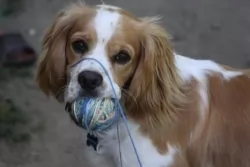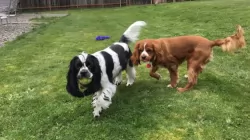 MyDogBreeds
MyDogBreeds Both Cockalier and American Foxhound are originated from United States. Cockalier may grow 26 cm / 10 inches shorter than American Foxhound. Cockalier may weigh 20 kg / 44 pounds lesser than American Foxhound. Cockalier may live 3 years more than American Foxhound. Cockalier may have less litter size than American Foxhound. Cockalier requires Moderate maintenance. But American Foxhound requires Low maintenance
Both Cockalier and American Foxhound are originated from United States. Cockalier may grow 26 cm / 10 inches shorter than American Foxhound. Cockalier may weigh 20 kg / 44 pounds lesser than American Foxhound. Cockalier may live 3 years more than American Foxhound. Cockalier may have less litter size than American Foxhound. Cockalier requires Moderate maintenance. But American Foxhound requires Low maintenance
 Known also as the Cockalier Spaniel, the Cockalier is a sweet crossbreed – a mix between the Cocker Spaniel and the Cavalier King Charles spaniel.
Known also as the Cockalier Spaniel, the Cockalier is a sweet crossbreed – a mix between the Cocker Spaniel and the Cavalier King Charles spaniel.
Both of these spaniels do have some differences. The Cockalier is a designer breed that hails from the USA. Because he is a hybrid breed the Cockalier isn’t recognized by the American Kennel Club, but as a hybrid, it is recognized by the American Canine Hybrid Club (ACHC).
 As a cousin of the English Foxhound, the American Foxhound is a scent hound and bred for hunting. Robert Brooke brought the first hunting dogs to the colonies in 1650. These dogs were the starting point for several American hound breeds including the American Foxhound.
As a cousin of the English Foxhound, the American Foxhound is a scent hound and bred for hunting. Robert Brooke brought the first hunting dogs to the colonies in 1650. These dogs were the starting point for several American hound breeds including the American Foxhound.
For almost 300 years the Brooke family owned and bred dogs from this bloodline.
At the same time that Brooke was hunting with and breeding his hounds, George Washington was given French Foxhounds. These were crossed with the Brooke’s dogs to create the American Foxhound. This breed is said to have been originally bred in Virginia and Maryland.
They are the state dog of Virginia. After Red Foxes were imported or migrated, Irish Foxhounds were brought to American and added into the line, increasing the stamina and speed that today’s dog’s still display.
The American Foxhound was recognized by the American Kennel Club in 1886. Today’s American Foxhound presents in many different lines but are all considered the same breed even though some ay look very different. These strains include the Trigg, Walker, Penn-Marydel, Goodman, July and Calhoun.
 The Cockalier is a medium-sized dog standing at between 30 and 38cm in height and weighing roughly between 5 and 12kg.
The Cockalier is a medium-sized dog standing at between 30 and 38cm in height and weighing roughly between 5 and 12kg.
The coat of the Cockalier is silky and wavy. The coat is medium length and can be in colors such as golden, red, black or maybe white and brown.
The ears are fairly long and floppy, the eyes brown and expressive and the tail docked. If left, the tail is long and feathery.
The Cockalier is lively, gentle, intelligent and friendly with his human family, though he can be a little bit aloof with strangers.
He bonds very strongly with his family. They’re robust and are playful with children. They’re active dogs too and love nothing more than a hectic ball game. They don’t know when to stop and can become utterly exhausted if you don’t stop the game.
Have him trained and socialized and then he becomes even more amicable and he’s smart enough to learn basic commands without any trouble.
 Given the variety of bloodlines and strains mentioned above, there can be many differences in the American Foxhounds. Because of this most American Foxhounds bred to show are Walkers as they most closely fit the AKC Breed Standard.
Given the variety of bloodlines and strains mentioned above, there can be many differences in the American Foxhounds. Because of this most American Foxhounds bred to show are Walkers as they most closely fit the AKC Breed Standard.
In general, the American Foxhound has long, straight legs and is taller than the English Foxhound. They have a narrow chest and domed skull with a long muzzle.
They have low, wide set eyes that should be dark – brown or hazel, never blue. They have feet like a fox and laid-back shoulders with a curved tail. Athletic and muscled, the American Foxhound is bred to run. They are one of the rarest breeds in the United States.
 The Cockalier is such a clever dog and he wants to please. He just loves his human owners, protecting them against strangers. He doesn’t take too kindly to strangers, preferring to devote all his love and loyalty to those he knows.
The Cockalier is such a clever dog and he wants to please. He just loves his human owners, protecting them against strangers. He doesn’t take too kindly to strangers, preferring to devote all his love and loyalty to those he knows.
He just craves attention and wants to be in your vicinity all the time. He is also good with children and will get on well with other pets in the home.
Once you’ve had a Cockalier in your life, you’ll want to reconsider having one of them again as they make awesome pets and companions.
 With a reputation as a docile, sweet dog, the American Foxhound is great with kids and animals. They are gentle and often very shy with strangers. They are strong willed and stubborn especially when training them, so they are not a good first dog. They need an owner who has handled dogs before and knows how to be the pack leader without being angry or mean.
With a reputation as a docile, sweet dog, the American Foxhound is great with kids and animals. They are gentle and often very shy with strangers. They are strong willed and stubborn especially when training them, so they are not a good first dog. They need an owner who has handled dogs before and knows how to be the pack leader without being angry or mean.
The American Foxhound is a scent hound and once he is on the scent it is close to impossible to distract him from it. They have a tendency to ignore commands when they are in this state. A strong owner/leader is needed for this reason. Don’t let him off leash in an unfenced area.
 The Cockalier is a healthy dog breed and can reach between 12 and 15 years of age. Look out for common canine health issues such as hearing loss and ear infection and vision issues.
The Cockalier is a healthy dog breed and can reach between 12 and 15 years of age. Look out for common canine health issues such as hearing loss and ear infection and vision issues.
Cockaliers that have an ear infection will shake their head and scratch their ears. The inside of the ears may be red and there may be an unpleasant smell coming from the ears. Your pet will need to see the vet.
This is a common disease with King Charles Spaniels where the mitral valve wears out and leaks and is associated with a heart murmur.
The earliest sign of a leaking mitral valve is normally a heart murmur, but it doesn’t mean heart failure is imminent, but congestive heart failure will eventuallt occur. Your dog will tire when walking, be lethargic and also have a cough. It will definitely be time to see the vet.
 The American Foxhound, like most hunting dogs does not carry a lot of genetic disorders. But they can easily become overweight and this can cause major problems. Dysplasia of any type had been mostly unknown in this breed, but due to obesity it is cropping up on occasion. Breeders have not, and do not usually screed for any genetic diseases.
The American Foxhound, like most hunting dogs does not carry a lot of genetic disorders. But they can easily become overweight and this can cause major problems. Dysplasia of any type had been mostly unknown in this breed, but due to obesity it is cropping up on occasion. Breeders have not, and do not usually screed for any genetic diseases.
The most devastating health issue the American Foxhound faces is thrombocytopathy. We will go into more detail on this in the Care for Pet section. This is a disease of the blood system, namely the platelets.
 When you choose one of the commercially manufactured dog foods there are, you want to avoid those more inferior ones that have ingredients in them that can cause your dog to get sick.
When you choose one of the commercially manufactured dog foods there are, you want to avoid those more inferior ones that have ingredients in them that can cause your dog to get sick.
Look for the high-quality ones and choose the foods that have natural, wholesome ingredients in them. The vet can always help you with your decision to select a food that will of benefit to your pet.
Try to give your pet some good homemade food too such as some raw meat occasionally as well as boiled chicken, vegetables and brown rice. Fresh, cool water should be constantly available.
The Cockalier is going to require some brushing because he sheds quite a bit. Some dog owners prefer to get the Cockalier professionally trimmed. During grooming, check your pet over for any unusual lumps.
Your Cockalier will also need to have his nails trimmed, and because of the long ears, you will need to look inside the ears to ensure there is no redness and signs of infection.
Some dog owners don’t have the time or they don’t want to probe inside their pet’s ears and then a doggy-grooming-parlor can be a good idea as they do all this for you.
The Cockalier is an energetic dog, requiring a lot of exercise and games. These dogs love water games and will love you spraying him with water from the garden hose. Failing that, he’ll jump right into the swimming pool with you. Ball games are just up his street, and he will remind you every day that it’s time for his walk.
 Whether feeding a pup, or an adult American Foxhound, you need to be sure the food is high quality and that you don’t overfeed. The Foxhound is happy to eat as much as you give him. They like to eat. Make sure you measure and don’t free feed. Control what they are eating.
Whether feeding a pup, or an adult American Foxhound, you need to be sure the food is high quality and that you don’t overfeed. The Foxhound is happy to eat as much as you give him. They like to eat. Make sure you measure and don’t free feed. Control what they are eating.
For a puppy feed twice, a day – 2 to 3 cups of high quality puppy food. When he becomes an adult feed him once a day with 2 cups of adult food.
As mentioned previously, the American English Foxhound, like most of the hound breeds is a very healthy dog. They do not have many genetic health issues. They do have a risk for thrombocytopathy. This risk is slight, but all owners of American English Foxhounds should be aware of it.
This disease is a circulatory system disease with poorly or non-functioning platelets. Platelets are designed to assist in the control of bleeding and without functioning ones the dog can bleed excessively from just a minor cut or bleed internally from a minor injury. The disease can be treated but you have to notice it first. Depending on how severe the disease is, the treatment will vary. Some dogs will have to be given platelets.
This is a high energy breed that is very active and needs a lot of exercise. They are not good for the first-time owner as they are stubborn and hard to train. They need room to run and get frustrated and out of sorts if they don’t have it. They can live in the suburbs but only with a large fenced yard, an even larger dog park and regular walks. This dog needs a lot of exercise. The simplest thing to do is take him hunting.